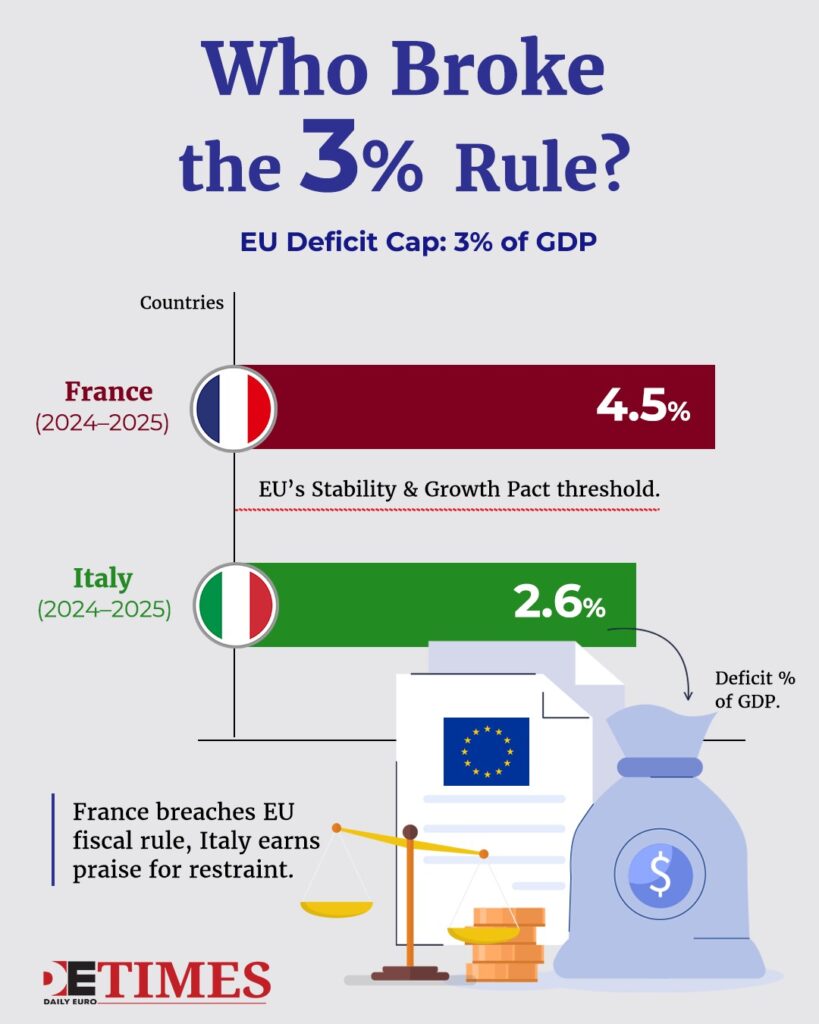Brussels once reserved its harshest fiscal lectures for Rome. Today, French President Emmanuel Macron sits in the EU’s penalty box while Italian Prime Minister Giorgia Meloni enjoys Brussels’ grudging respect.
The European Commission identified France as the largest economy breaching fiscal rules. Italy somehow escaped the same rebuke.
Paris Tumbles While Rome Rebuilds
After decades of EU scolding, Italy finally got its house in order. France meanwhile descended into unprecedented governmental instability after Macron’s snap election gamble backfired spectacularly.
Two French prime ministers have already fallen over budgetary disputes. Italian media outlets mock France as a société arriérée et corporatiste. The tables have turned completely.
France’s deficit breached the EU’s 3% limit. Italy manages to stay within bounds. The Stability and Growth Pact, once Italy’s nemesis, now targets French fiscal mismanagement instead.
Economic Discipline Yields Political Dividends
Italy’s newfound fiscal discipline stems from hard-won political stability.
Meloni’s government commands parliamentary majorities that eluded her predecessors. French politics fragments whilst Italian coalitions hold firm. Rome learnt painful lessons from past eurozone crises.
In contrast, France’s hung parliament makes coherent fiscal policy impossible. The New Popular Front blocks spending cuts whilst demanding higher taxes. Macron’s Renaissance party lacks sufficient seats for meaningful reform.
Government paralysis breeds fiscal indiscipline.

Brussels’ Shifting Allegiances
European officials once viewed Italy as the eurozone’s weak link. French technocrats lectured Roman counterparts about budgetary rigour. Now Brussels warns France about excessive deficits whilst praising Italian restraint.
Recent data confirms this role reversal. Compliance rates with EU fiscal rules dropped sharply across member states in 2024. France fell furthest from grace. Italy bucked the trend by maintaining discipline despite political transitions.
The EU’s new fiscal framework took effect this year. Member states must reduce debt ratios gradually whilst keeping deficits below 3% of GDP. Italy adapted quickly to these requirements. France struggles to meet basic thresholds.
Meloni’s Unexpected Vindication
Conservative critics long dismissed Meloni as a populist threat. Her party’s post-fascist roots sparked European establishment fears.
Yet Meloni governs pragmatically whilst Macron’s centrism produces chaos. Rome’s fiscal responsibility contrasts sharply with Parisian dysfunction. European elites quietly acknowledge their miscalculations.
Italian newspapers relish French difficulties. La Gazzetta and Corriere della Sera portray France as ungovernable and backward-looking. The boot is on the other foot entirely.
Lessons From Role Reversal
European integration depends on fiscal convergence between member states.
France’s current trajectory threatens this delicate balance. Italy’s transformation proves that structural reforms work when coupled with political will. The eurozone’s survival requires all major economies to pull their weight.
Neither French promises nor Italian achievements guarantee long-term success. Economic cycles turn quickly in modern Europe. Yesterday’s fiscal sinners become tomorrow’s saints. Brussels must prepare for further reversals of fortune.
Keep up with Daily Euro Times for more updates!
Read also:
Italy: Meloni’s Victory With a Age Old Caveat
Delaying the Inevitable: Trump’s Refinancing of U.S. Debt
Freeriders: Spain and Italy Opt Out of NATO Hike






